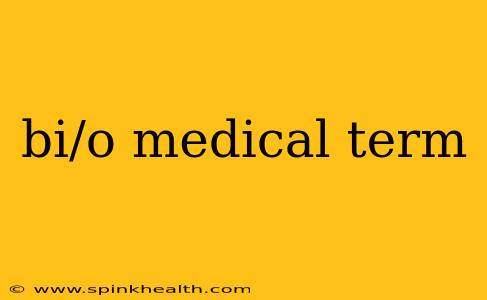Decoding the Mysterious World of Bi/o Medical Terms: A Journey Through Prefix and Suffix
The world of medicine often feels like a foreign language, filled with complex terms that leave even the most curious minds scratching their heads. But what if I told you that many of these seemingly impenetrable words are built upon a surprisingly simple foundation? Today, we'll unravel the mysteries behind the "bi/o" medical terms, exploring their origins and showing you how to decipher their meanings. This isn't just about memorization; it's about understanding the building blocks of medical vocabulary, empowering you to approach any unfamiliar term with confidence.
Our story begins with the Greek word "bios," meaning "life." This simple word is the cornerstone of countless medical terms, acting as a prefix or a root indicating a connection to living organisms, biological processes, or the science of life itself. Let's delve into some examples, unveiling the secrets behind their composition.
What does "bio" mean in medical terms?
This is a fundamental question, and the answer is straightforward: "Bio" in medical terminology almost always refers to life, living organisms, or biological processes. It's the foundation upon which many complex terms are built. Think of it as a key that unlocks the meaning of many medical words.
What are some common medical terms that start with "bio"?
Now, let's explore some real-world examples. This isn't just about listing terms; it's about understanding how "bio" shapes their meaning.
-
Biochemistry: This term immediately tells us it's the study of the chemical processes within and relating to living organisms. "Bio" signifies the living aspect, while "chemistry" indicates the chemical processes involved.
-
Biopsy: Here, "bio" again points to living tissue. A biopsy is, therefore, the process of removing a sample of living tissue for examination.
-
Biotechnology: This field leverages biological systems, living organisms, or derivatives thereof to develop or make products. The "bio" component clearly highlights the biological foundation of this technology.
-
Biofeedback: This technique involves using electronic devices to monitor bodily functions like heart rate or muscle tension, allowing individuals to gain control over these processes. The "bio" element refers to the biological functions being monitored and controlled.
-
Biomechanics: This interdisciplinary field applies mechanical principles to biological systems, studying the structure and function of living organisms. "Bio" again clarifies the focus on living systems.
How can I learn more about medical terminology?
Learning medical terminology can feel overwhelming, but it's a skill developed incrementally. Start by focusing on prefixes and suffixes, the building blocks of many medical words. Many resources exist, including medical dictionaries and online courses that break down complex terms into manageable components. Remember, the key is to break down complex terms into their component parts. Understanding prefixes, suffixes, and roots like "bio" will dramatically improve your comprehension.
Are there other prefixes similar to "bio" in medical terminology?
While "bio" is prevalent, other prefixes contribute to our understanding of medical terms, often reflecting origins and functions. Understanding these broader linguistic foundations further enhances comprehension.
What resources can help me understand complicated medical terms?
Several resources can support your journey. Medical dictionaries, online terminology websites, and even medical textbooks offer structured approaches to learning and deciphering medical jargon. Remember to consult reliable and reputable sources to ensure accuracy.
This journey into the world of "bi/o" medical terms has just begun. By understanding the foundation of these words, you're not only building your medical vocabulary but also developing a deeper appreciation for the science of life itself. The next time you encounter an unfamiliar medical term, remember the power of breaking it down, piece by piece. You might be surprised at how much you can understand with a little detective work.

